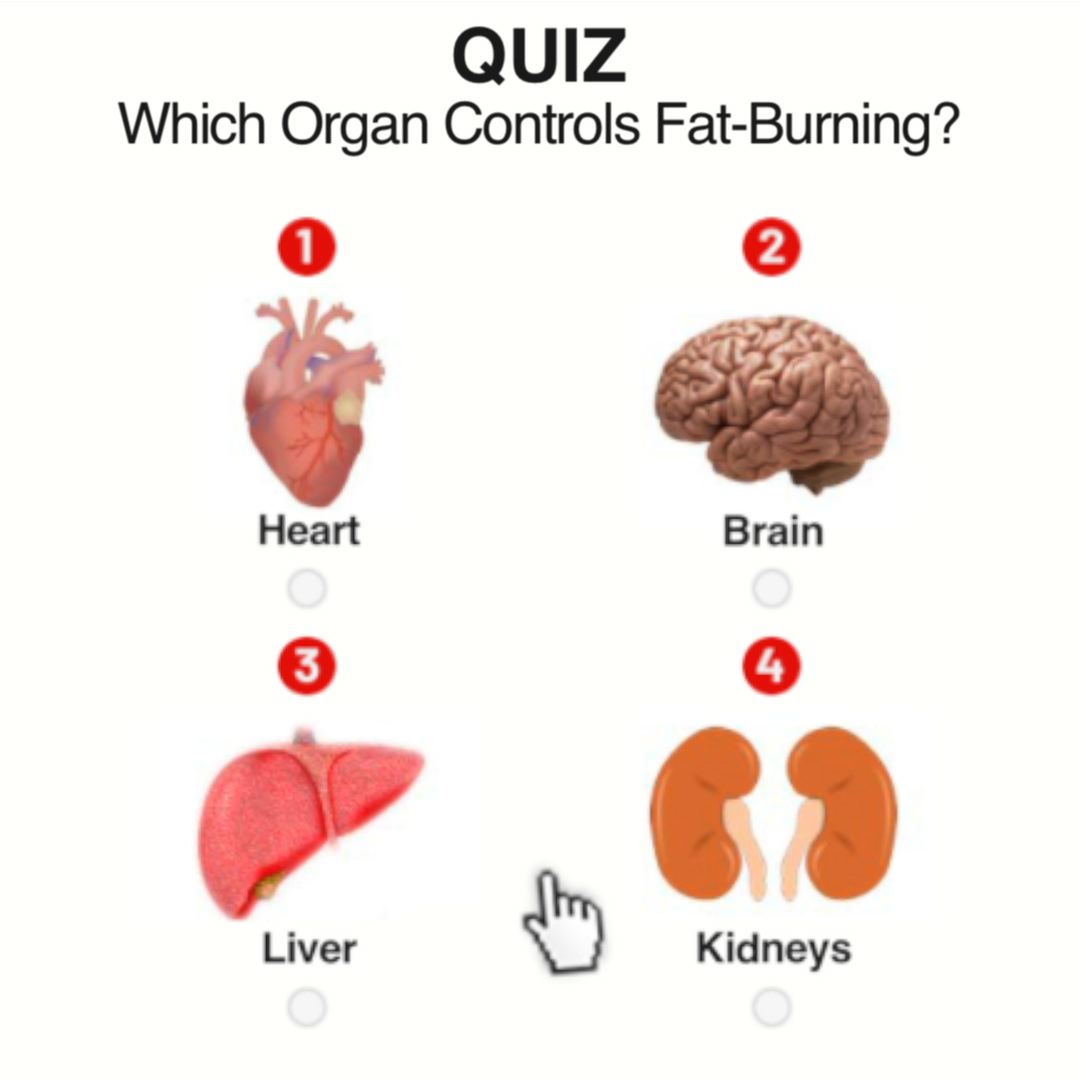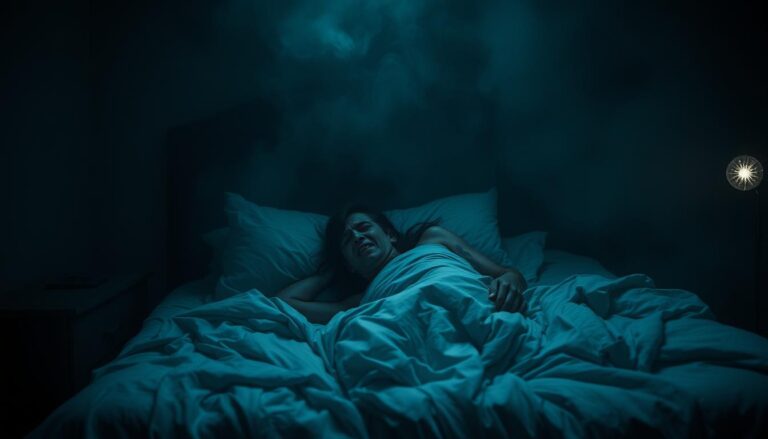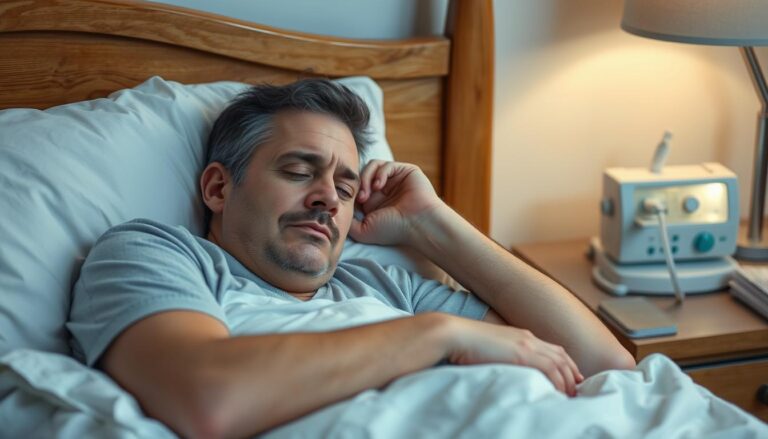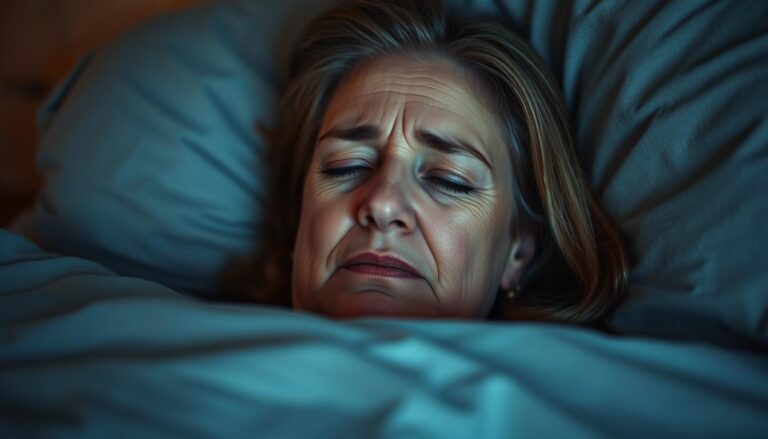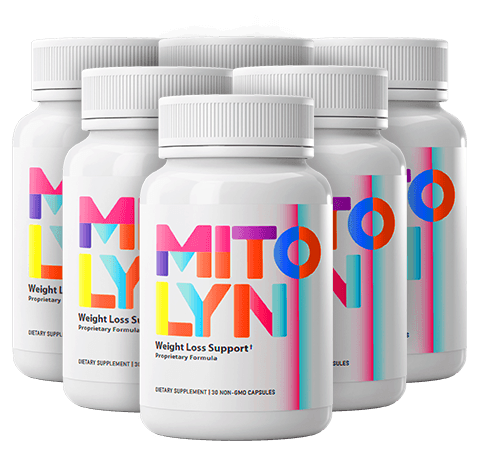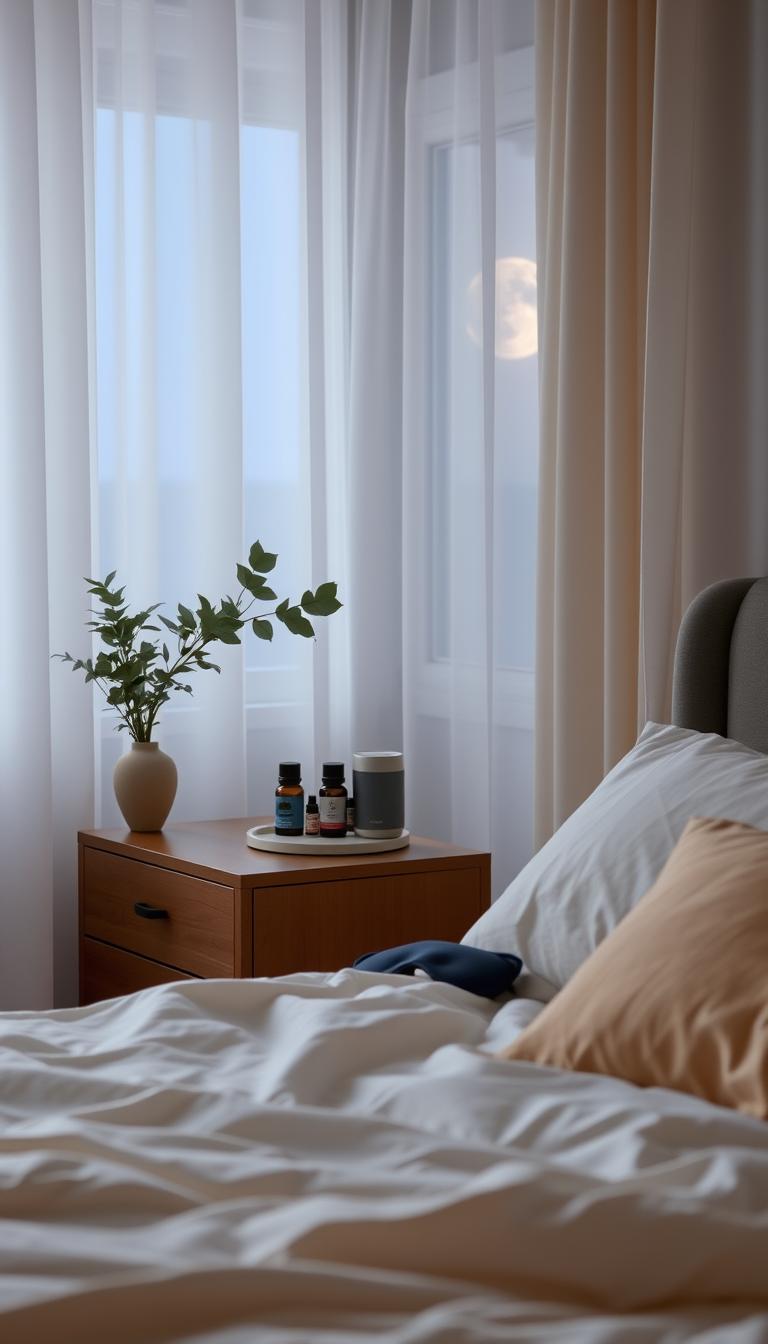
What if falling asleep in minutes wasn’t just a myth? Millions struggle with insomnia, but science has solutions. With 1 in 3 Americans not getting enough sleep, finding fast sleep methods is crucial. Imagine using sleep techniques to calm your mind and body, falling asleep quickly.
From the military method’s 96% success to Dr. Andrew Weil’s 4-7-8 breathing, this guide shows you how. You’ll learn to adjust your environment, manage stress, and use exercises like progressive muscle relaxation. Better sleep starts with understanding why your brain resists rest and how to beat it.
Why do 30% of adults still feel tired, even with sleep aids? Personalized routines are the key. This article shares steps to improve sleep, from cooler rooms to no screens before bed. Small changes can make a big difference.
Key Takeaways
- Over 100 million Americans face sleep struggles, but evidence-based sleep techniques can help.
- Methods like the military method and 4-7-8 breathing offer science-backed ways to fall asleep quickly.
- Adjusting routines—like consistent bedtimes and avoiding caffeine—boost sleep quality.
- Simple fixes like blackout curtains or weighted blankets can reduce insomnia symptoms.
- Paradoxical intention and visualization calm anxiety to improve sleep onset naturally.
Understanding Sleep Challenges in Modern Life
In today’s fast world, many struggle with sleep problems. This is due to digital distractions, stress and sleep issues, or messy sleep schedules. Let’s look at how modern habits impact your sleep and how to take back control.
Common Causes of Sleep Difficulties
These things often block your path to good sleep:
- Screen time: Blue light from phones or TVs messes with your sleep cycle and delays melatonin release.
- Stress and anxiety: Work stress or life pressures cause sleep anxiety, keeping your brain awake.
- Irregular routines: Late-night scrolling or inconsistent bedtimes confuse your body’s natural rhythms.
The Impact of Poor Sleep on Your Health
Ignoring sleep problems has serious effects. Chronic sleep deprivation effects weaken your sleep immune system. It also harms cognitive performance and increases risks for sleep mental health issues like anxiety. One study showed even one bad night’s sleep can cloud focus and mood for days.
“A consistent sleep schedule strengthens your sleep health connection, lowering risks of diabetes and heart disease.” — National Sleep Foundation
Setting Realistic Sleep Goals
Seek balance, not perfection. Aim for ideal sleep duration (7-9 hours for most adults) and focus on sleep quality vs quantity. A reliable sleep routine—like avoiding screens an hour before bed—helps reset your body clock. Small changes, like relaxing with a warm drink or reading, build better sleep habits over time.
Creating the Perfect Pre-Sleep Routine
Your bedtime routine is a secret to better sleep. It’s not just about being clean. It’s about habits that get your mind and body ready for sleep. A consistent sleep schedule is crucial.
Going to bed and waking up at the same time every day is important. This trains your body’s internal clock. It makes sleep better and easier to fall into.
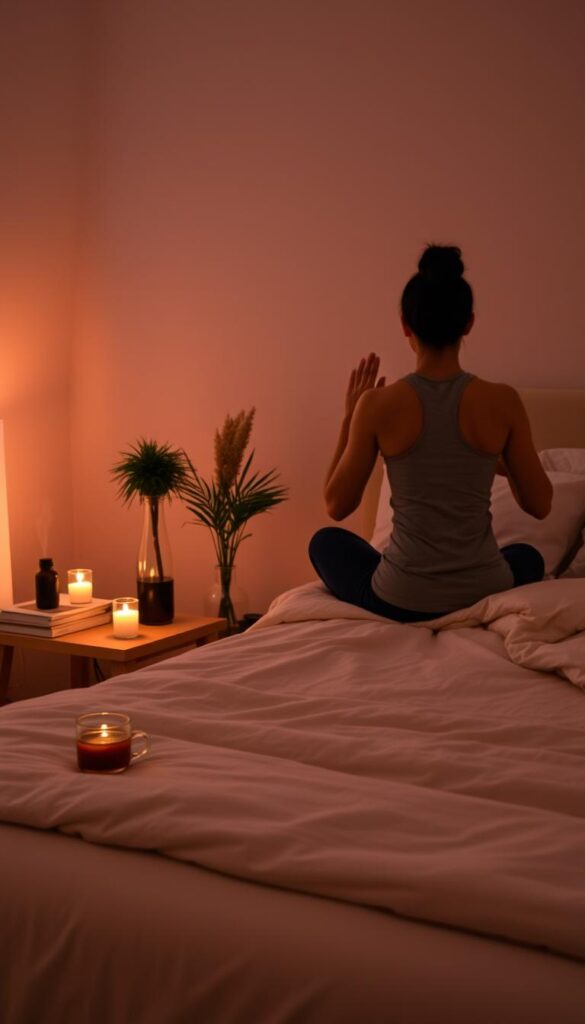
- Incorporate wind-down activities like reading a book, gentle yoga, or journaling to signal it’s time to relax.
- Try a warm bath with products like Pure Zzzs Shower Mist to mimic the body’s natural temperature drop before sleep.
- Dim lights in the evening to boost melatonin production and avoid blue light from screens.
Nighttime habits should avoid stimulants like caffeine and heavy meals. Light snacks like cherries or almonds are okay. Keep your bedroom cool, dark, and quiet for better rest.
If you find it hard to relax, try meditation apps or white noise machines.
Try different strategies to find your perfect routine. Sticking to a consistent sleep schedule will help your body know when to sleep. Good nighttime habits lead to deeper, better sleep. Start by making this routine a priority.
Proven Relaxation Techniques for Better Sleep
Stress affects 44% of adults’ sleep. But, there are ways to ease tension and quiet the mind. These methods combine body relaxation techniques and mental strategies. They help address both physical and mental barriers to rest. Use them as part of your bedtime routine to reset your body and mind.

Progressive Muscle Relaxation
This PMR sleep technique targets muscle tension sleep issues. Start by lying down and tensing each muscle group for 10 seconds. Begin with your toes and move upward. Release each group, noticing the contrast between tension and relaxation.
This tension release process signals your nervous system to relax. Try guided sessions on apps like MyKokoon for guided steps.
Breathing Exercises to Calm Your Mind
Mastery of sleep breathing techniques like the 4-7-8 method can lower heart rate. Here’s how to practice it: Breathe in through your nose for 4 seconds, hold for 7, then exhale for 8. Pair this with diaphragmatic breathing—focusing on deep belly breaths—to activate the body’s relaxation response.
Consistent practice improves breath control and reduces stress hormones.
Visualization and Guided Imagery
Replace racing thoughts with vivid peaceful scenes like a forest stream or cozy cabin. Engage all senses: imagine the smell of pine, the sound of water, and the feel of soft grass. This sleep visualization shifts focus away from stress.
Apps like MyKokoon offer guided imagery scripts to make this easier. Studies show this method helps users fall asleep faster than generic relaxation.
Meditation Practices for Sleep
Bedtime mindfulness for sleep sessions calm an overactive mind. Sit quietly, focus on your breath, and let thoughts pass without judgment. Even 10 minutes of meditation techniques can reduce anxiety.
Apps like MyKokoon provide sleep meditation guides. Over time, meditation benefits include deeper sleep cycles and fewer night awakenings.
| Technique | Method | Benefits |
|---|---|---|
| PMR Sleep Technique | Sequential muscle tensing and release | Reduces physical tension and improves sleep onset |
| 4-7-8 Breathing | Inhale 4, hold 7, exhale 8 | Activateses the body’s relaxation response |
| Guided Imagery | Imagining detailed peaceful settings | Lowers cortisol and quiets the mind |
| Mindfulness Meditation | Focus on present-moment awareness | Reduces anxiety and improves sleep quality |
Practice these methods nightly for 20-25 minutes to build effectiveness. Pair them with a consistent bedtime routine for lasting results.
How to Fall Asleep Quickly Using the Military Method
Stress can keep you up all night. The military sleep technique offers a way to calm your mind and body. It was created by Olympic coach Lloyd Bud Winter in 1981. This combat sleep technique uses 4-7-8 breathing science, body awareness, and mindset changes.
It claims to help you fall asleep in just two minutes with practice. Over 15% of U.S. adults have trouble falling asleep. This method aims to help.

The Science Behind the 4-7-8 Breathing Technique
The 4-7-8 pattern is key: breathe in for 4 seconds, hold for 7, breathe out for 8. This sleep breathing pattern slows your heart rate. It triggers the parasympathetic nervous system.
Dr. Brian Koo says it shifts your focus from stress to physical sensations. This reduces performance anxiety. Studies show it lowers cortisol levels, like progressive relaxation.
Body Scanning for Full-Body Release
Begin at your toes and move up, noticing any tension awareness. This body scan meditation builds mindful body awareness. It helps release tension in your body.
Practicing this for six weeks can improve sleep onset. Studies on progressive relaxation and insomnia support this.
Paradoxical Intention: Flip the Script
Paradoxical intention is trying to stay awake. This reverse psychology sleep reduces the sleep effort mindset. By accepting you might not sleep, you avoid the sleep paradox.
Sleep experts like Victoria Bangieva suggest using this with the military method. It can lead to better sleep.
“Focusing on physical relaxation distracts the mind from racing thoughts—this is why the military method works,” says Dr. Koo.
Use calming pre-bed routines like reading or stretching for best results. While no method works instantly, these steps can help. They can reduce the time it takes to fall asleep and improve sleep quality.
Optimizing Your Sleep Environment
Your bedroom setup can turn any room into a sleep sanctuary. Adjust these four factors to create optimal sleep conditions:

- Temperature: Keep your room between 65–68°F (18–20°C). Cooler temps signal your body it’s time to rest. Use a fan or AC in summer, and layers in winter.
- Light: Block light with blackout curtains or an eye mask. Even 10 lux of light at night can delay melatonin production, so turn off screens 1 hour before bed.
- Sound: Dull noise with earplugs or a white noise machine. Soft background sounds like rainfall apps can drown out disruptions.
- Comfort: Invest in a supportive mattress and breathable bedding. Airing your mattress monthly to reduce dust mites, and test pillow firmness for your sleep position.
Scents like lavender oil boost relaxation—studies show it improves sleep quality by 20%. Choose bedding made of breathable materials like bamboo or organic cotton to stay cool.
Personalize your setup: Some prefer blackout curtains, others use a humidifier for dry climates. Your comfortable bedroom balances these elements uniquely. Track changes like turning off electronics or adjusting pillow height to see what works best.
Dietary Choices That Influence Your Sleep Quality
Your diet affects your sleep more than you think. Some foods help you relax, while others mess with your sleep. Start with foods that help you sleep, like those with tryptophan and melatonin.
Tryptophan is in turkey, milk, and eggs. It helps make melatonin, the sleep hormone. Foods like tart cherry juice and kiwi have melatonin too. Whole grains and nuts have magnesium, which calms the body.
- Bedtime snacks like oatmeal or bananas combine tryptophan sleep with complex carbs to boost serotonin.
- Fatty fish and pumpkin seeds offer zinc and magnesium to ease nervous system tension.
“Caffeine sleep effects isn’t just about coffee. Decaf can still have over 13 milligrams of caffeine per 16 oz, delaying melatonin production.”
Avoid eating spicy or sugary foods at night. They can cause heartburn and raise blood sugar. Alcohol also disrupts sleep, especially for those with sleep apnea.
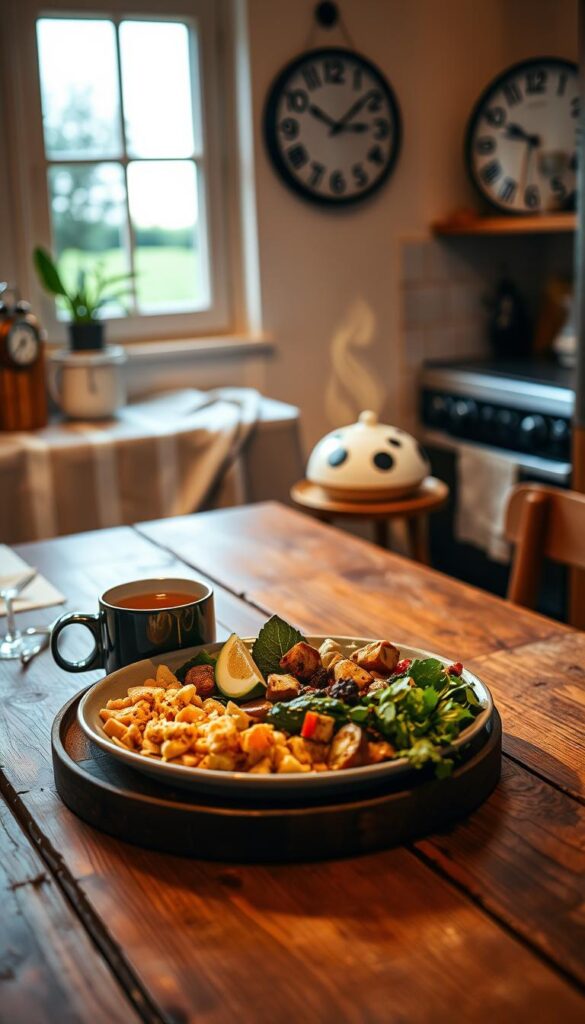
Eat dinner 2-3 hours before bed. Some find late night eating or fasting helps. But everyone is different. Keep your evening meals light, like yogurt with almonds or a small salad.
Also, avoid caffeine 8+ hours before bed. This helps prevent blood sugar dips at night.
Pair smart food timing with other habits like dimming lights. Small changes in what and when you eat can greatly improve your sleep.
Technology and Tools to Enhance Sleep
Modern tech offers tools for better sleep. Apps and devices can help your sleep routine. Let’s see how they work and which ones might be right for you.

Begin with sleep tracking apps like sleep cycle apps or bedtime reminder apps. Apps like Calm mix meditation apps with white noise apps. They offer guided sessions or ocean sounds to calm your mind.
The Loftie Clock, priced at $150, uses AI for personalized audio sleep aids. It combines nature sounds sleep with customizable alarms.
- White noise benefits: Machines or apps with pink noise sleep or white noise science reduce noise. Pink noise, deeper than white, can help you sleep deeper, studies show.
- Track effectively: Wearable sleep trackers like the Sleepme Dock Pro ($1,149) track sleep stages tracking and adjust temperature. But make sure data from sleep monitoring helps you without stressing over sleep data analysis.
“Sleep improvement technology” isn’t a magic fix. Use it to spot patterns, like late-night screen use, then change your habits.
Combine tech with simple steps: dim lights, cool rooms, and no screens. Let devices help, not take over, your routine. Try sound machine benefits or sleep improvement technology to see what works for you.
Natural Supplements and Remedies for Sleep
Looking into natural sleep remedies can help you sleep better without meds. Always talk to a doctor first to make sure it’s safe. This helps avoid any bad reactions.
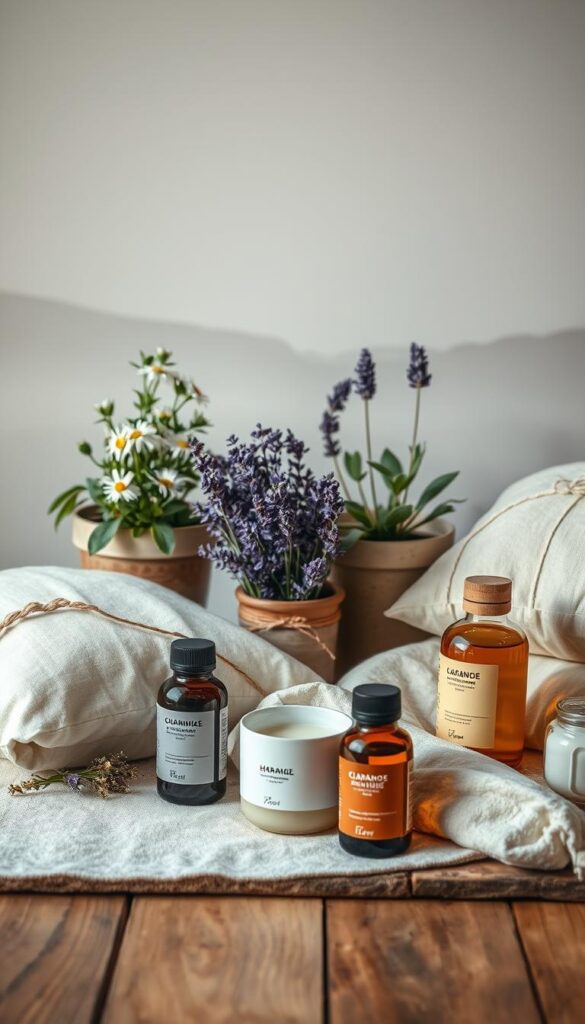
Melatonin supplements are a top pick to fix your sleep cycle. They act like your body’s sleep hormone, helping with jet lag or odd schedules. Start with a small dose and follow the directions to avoid feeling too sleepy the next day.
Magnesium is also great for sleep. It helps older adults sleep better. Choose magnesium glycinate or citrate for better absorption.
- Herbal sleep aids like valerian root or chamomile tea can calm you before bed.
- Passionflower and lavender essential oils have calming effects too.
- Tart cherry juice boosts sleep by adding natural melatonin.
Acupressure can also help. Pressing points like Spirit Gate, Inner Frontier Gate, and Wind Pool relaxes you before bed. Do this for 2-3 minutes each.
Choose natural sleep remedies that fit your health needs. Stay away from kava or high-dose supplements that can harm your liver. See how each remedy works and change your routine slowly.
When to Seek Professional Help for Sleep Issues
If you can’t sleep well on your own, it’s time to get help. Chronic insomnia or sleep apnea signs mean you might need a doctor. A sleep clinic can help you sleep better at night.

Signs Your Sleep Problems Might Be Medical
- Having trouble falling asleep for chronic insomnia over three months
- Gasping for air while sleeping (a sleep apnea sign)
- Leg discomfort at night from restless legs syndrome
- Feeling very tired during the day
Types of Sleep Specialists and What They Offer
| Specialist | Focus | Treatments Options |
|---|---|---|
| Sleep Medicine Doctors | Diagnosing sleep disorders | Polysomnography, CPAP therapy |
| Sleep Psychologists | Behavioral therapies | Cognitive behavioral therapy insomnia (CBT-I) |
| Sleep Technologists | Administering sleep studies | Overnight polysomnography monitoring |
What to Expect at a Sleep Consultation
At a sleep evaluation, you’ll talk about your sleep diary and answer questionnaires. A sleep doctor visit might include:
- Talking about your medical history and medicines
- A physical exam to check your airway or brain function
- A sleep study at a clinic or at home
- A treatment plan made just for you
Seeing a doctor early can help you sleep better and stay healthy longer.
Conclusion: Building a Personalized Sleep Strategy That Works for You
Your personalized sleep plan begins with small, thoughtful choices. A warm bath or a 4-7-8 breathing exercise can help you relax. Keep track of how these routines change your energy.
Being consistent in your sleep habits makes these steps into lasting routines. Even small changes, like dimming lights or keeping your room cool, help improve sleep over time.
Try out the tips that feel right to you. Do calming scents or stopping caffeine after 2 PM help? Adjust as you see fit—your sleep improvement journey is special. These small changes add up over weeks, leading to better focus and mood.
Remember, sleep is a skill that grows with practice. Celebrate your successes and learn from others. Small victories lead to better sleep and a healthier life.
FAQ
What are some common causes of sleep difficulties?
Many people have trouble sleeping because of technology, work stress, and irregular schedules. Poor sleep habits and lifestyle choices also play a role. For example, blue light from devices can mess with melatonin and make it hard to fall asleep.
How does poor sleep affect my overall health?
Not getting enough sleep can harm your health a lot. It weakens your immune system and hurts your brain. It also raises the risk of obesity, diabetes, heart disease, and depression. So, getting good sleep is key to staying healthy.
What is the ideal sleep duration for different age groups?
Sleep needs change with age. Adults should sleep 7-9 hours, while teens need 8-10 hours. Knowing this helps you set sleep goals that fit your life.
What are some effective pre-sleep routines to establish?
Good pre-sleep routines include reading, meditating, or taking a warm bath. Start these activities at the same time each night. This tells your body it’s time to sleep.
What relaxation techniques are proven to improve sleep?
Relaxation techniques like Progressive Muscle Relaxation and breathing exercises work well. Visualization and meditation also help calm your mind and body, making it easier to sleep.
Can you explain the 4-7-8 breathing technique?
The 4-7-8 technique means breathe in for 4 seconds, hold for 7, and breathe out for 8. It reduces stress and helps you relax by triggering your calm response.
How can my diet affect my sleep?
Eating foods with magnesium and tryptophan can help you sleep better. But, avoid caffeine and heavy meals before bed. Your diet affects your sleep quality.
What technologies can assist in enhancing my sleep?
Sleep apps, white noise machines, and sleep trackers are helpful. They offer sounds, tracking, and help with sleep cycles. These tools improve your sleep habits.
When should I consider seeking professional help for sleep issues?
If you have chronic insomnia, daytime sleepiness, or loud snoring, see a sleep specialist. Early help is important for sleep disorders.
How do I prepare for a sleep consultation?
Before your appointment, collect sleep diaries, medication lists, and symptom notes. This helps your doctor understand your sleep and plan a treatment.









